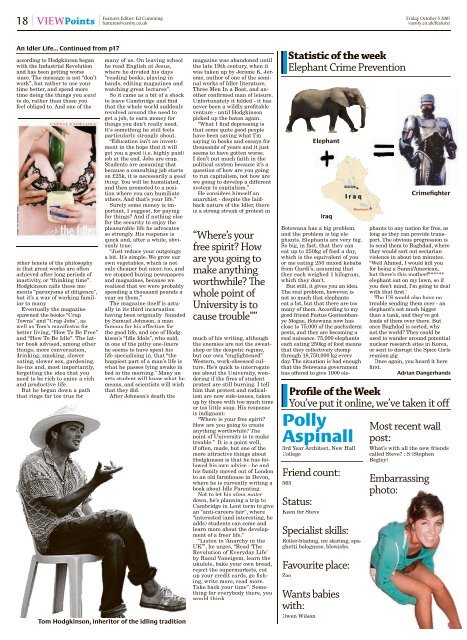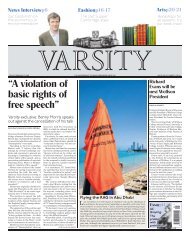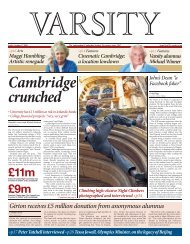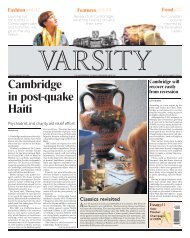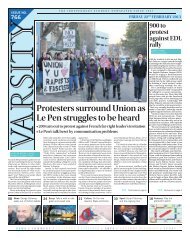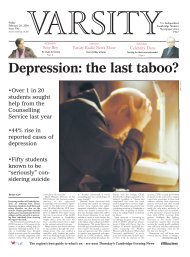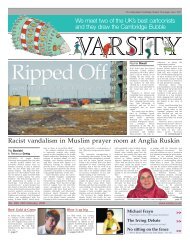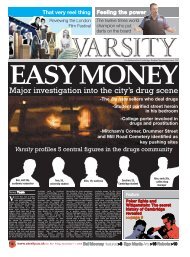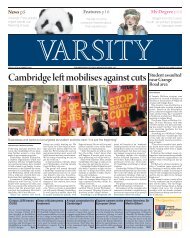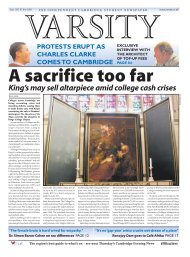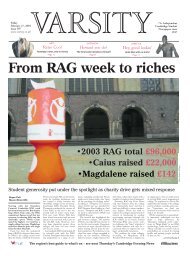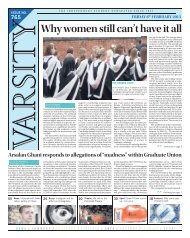Features Music Fashionp21 - Varsity
Features Music Fashionp21 - Varsity
Features Music Fashionp21 - Varsity
Create successful ePaper yourself
Turn your PDF publications into a flip-book with our unique Google optimized e-Paper software.
<strong>Features</strong> Editor: Ed Cumming<br />
18 VIEWPoints features@varsity.co.uk<br />
Friday October 5 2007<br />
varsity.co.uk/features<br />
An Idler Life... Continued from p17<br />
according to Hodgkinson began<br />
with the Industrial Revolution<br />
and has been getting worse<br />
since. The message is not “don’t<br />
work”, but rather to use your<br />
time better, and spend more<br />
time doing the things you want<br />
to do, rather than those you<br />
feel obliged to. And one of the<br />
other tenets of the philosophy<br />
is that great works are often<br />
achieved after long periods of<br />
inactivity, or “thinking time”.<br />
Hodgkinson calls these moments<br />
“paroxysms of diligence”,<br />
but it’s a way of working familiar<br />
to many.<br />
Eventually the magazine<br />
spawned the books “Crap<br />
Towns” and “Crap Jobs”, as<br />
well as Tom’s manifestos for<br />
better living, “How To Be Free”<br />
and “How To Be Idle”. The latter<br />
book advised, among other<br />
things; more conversation,<br />
drinking, smoking, slower<br />
eating, slower sex, gardening,<br />
lie-ins and, most importantly,<br />
forgetting the idea that you<br />
need to be rich to enjoy a rich<br />
and productive life.<br />
But he began down a path<br />
that rings far too true for<br />
many of us. On leaving school<br />
he read English at Jesus,<br />
where he divided his days<br />
“reading books, playing in<br />
bands, editing magazines and<br />
watching great lectures”.<br />
So it came as a bit of a shock<br />
to leave Cambridge and find<br />
that the whole world suddenly<br />
revolved around the need to<br />
get a job, to earn money for<br />
things you don’t really need.<br />
It’s something he still feels<br />
particularly strongly about.<br />
“Education isn’t an investment<br />
in the hope that it will<br />
get you a good (i.e. highly paid)<br />
job at the end. Jobs are crap.<br />
Students are assuming that<br />
because a consulting job starts<br />
on £25k, it is necessarily a good<br />
thing. You will be humiliated,<br />
and then promoted to a position<br />
where you can humiliate<br />
others. And that’s your life.”<br />
Surely some money is important,<br />
I suggest, for paying<br />
for things And if nothing else<br />
for the security to enjoy the<br />
pleasurable life he advocates<br />
so strongly. His response is<br />
quick and, after a while, obviously<br />
true:<br />
“Just reduce your outgoings<br />
a bit. It’s simple. We grow our<br />
own vegetables, which is not<br />
only cheaper but nicer, too, and<br />
we stopped buying newspapers<br />
and magazines, because we<br />
realised that we were probably<br />
spending a thousand pounds a<br />
year on them.”<br />
The magazine itself is actually<br />
in its third incarnation<br />
having been originally founded<br />
by Samuel Johnson, a man<br />
famous for his affection for<br />
the good life, and one of Hodgkison’s<br />
“Idle Idols”, who said,<br />
in one of the pithy one-liners<br />
he seems to have spent his<br />
life specialising in, that “the<br />
happiest part of a man’s life is<br />
what he passes lying awake in<br />
bed in the morning.” Many an<br />
arts student will know what he<br />
means, and scientists will wish<br />
that they did.<br />
After Johnson’s death the<br />
Tom Hodgkinson, inheritor of the idling tradition<br />
magazine was abandoned until<br />
the late 19th century, when it<br />
was taken up by Jerome K. Jerome,<br />
author of one of the seminal<br />
works of Idler literature,<br />
Three Men In a Boat, and another<br />
confirmed man of leisure.<br />
Unfortunately it folded - it has<br />
never been a wildly profitable<br />
venture - until Hodgkinson<br />
picked up the baton again.<br />
“What I find depressing is<br />
that some quite good people<br />
have been saying what I’m<br />
saying in books and essays for<br />
thousands of years and it just<br />
seems to have gotten worse.<br />
I don’t put much faith in the<br />
political system because it’s a<br />
question of how are you going<br />
to run capitalism, not how are<br />
we going to develop a different<br />
system to capitalism.”<br />
He considers himself an<br />
anarchist - despite the laidback<br />
nature of the Idler, there<br />
is a strong streak of protest in<br />
“Where’s your<br />
free spirit How<br />
are you going to<br />
make anything<br />
worthwhile The<br />
whole point of<br />
University is to<br />
cause trouble””<br />
much of his writing, although<br />
the enemies are not the sweatshop<br />
or the despotic regime,<br />
but our own “englightened”<br />
Western, work-obsessed culture.<br />
He’s quick to interrogate<br />
me about the University, wondering<br />
if the fires of student<br />
protest are still burning. I tell<br />
him that protest and radicalism<br />
are now side-issues, taken<br />
up by those with too much time<br />
or too little soap. His response<br />
is indignant:<br />
“Where is your free spirit<br />
How are you going to create<br />
anything worthwhile The<br />
point of University is to make<br />
trouble.” It is a point well,<br />
if often, made, but one of the<br />
more attractive things about<br />
Hodgkinson is that he has followed<br />
his own advice - he and<br />
his family moved out of London<br />
to an old farmhouse in Devon,<br />
where he is currently writing a<br />
book about Idle Parenting.<br />
Not to let his alma mater<br />
down, he’s planning a trip to<br />
Cambridge in Lent term to give<br />
an “anti-careers fair”, where<br />
“interested (and interesting, he<br />
adds) students can come and<br />
learn more about the development<br />
of a freer life.”<br />
“Listen to ‘Anarchy in the<br />
UK’”, he urges, “Read ‘The<br />
Revolution of Everyday Life’<br />
by Raoul Vaneigem, learn the<br />
ukulele, bake your own bread,<br />
reject the supermarkets, cut<br />
up your credit cards, go fishing,<br />
write more, read more.<br />
Take back your time”. Something<br />
for everybody there, you<br />
would think.<br />
Statistic of the week<br />
Elephant Crime Prevention<br />
Profile of the Week<br />
You’ve put it online, we’ve taken it off<br />
Polly<br />
Aspinall<br />
3rd Year Architect, New Hall<br />
College<br />
Friend count:<br />
565<br />
Status:<br />
Keen for Steve<br />
Elephant<br />
Iraq<br />
Specialist skills:<br />
Roller-blading, ice skating, spaghetti<br />
bolognese, blowjobs.<br />
Favourite place:<br />
Zoo<br />
Wants babies<br />
with:<br />
Owen Wilson<br />
Botswana has a big problem,<br />
and the problem is big elephants.<br />
Elephants are very big.<br />
So big, in fact, that they can<br />
eat up to 250kg of food a day,<br />
which is the equivalent of you<br />
or me eating 250 mixed kebabs<br />
from Gardi’s, assuming that<br />
they each weighed 1 kilogram,<br />
which they don’t.<br />
But still, it gives you an idea.<br />
The real problem, however, is<br />
not so much that elephants<br />
eat a lot, but that there are too<br />
many of them. According to my<br />
good friend Festus Gontembanye<br />
Mogae, Botswana now has<br />
close to 75,000 of the pachyderm<br />
pests, and they are becoming a<br />
real nuisance. 75,000 elephants<br />
each eating 250kg of food means<br />
that they collectively chomp<br />
through 18,750,000 kg every<br />
day. The situation is bad enough<br />
that the Setswana government<br />
has offered to give 1000 elephants<br />
to any nation for free, as<br />
long as they can provide transport.<br />
The obvious progression is<br />
to send them to Baghdad, where<br />
they would sort out sectarian<br />
violence in about ten minutes.<br />
“Well Ahmed, I would kill you<br />
for being a Sunni/American,<br />
but there’s this motherf******<br />
elephant out on my lawn, so if<br />
you don’t mind, I’m going to deal<br />
with that first.”<br />
The US would also have no<br />
trouble sending them over - an<br />
elephant’s not much bigger<br />
than a tank, and they’ve got<br />
loads of them over there. But<br />
once Baghdad is sorted, why<br />
not the world They could be<br />
used to wander around potential<br />
nuclear research sites in Korea,<br />
or sent to disrupt the Spice Girls<br />
reunion gig.<br />
Once again, you heard it here<br />
first.<br />
Adrian Dangerhands<br />
Most recent wall<br />
post:<br />
What’s with all the new friends<br />
called Steve : S (Stephen<br />
Begley)<br />
Embarrassing<br />
photo:<br />
Crimefighter


